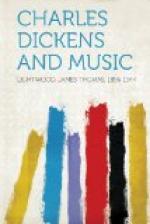’You never heard father in such voice as he is at present,’ said Mrs. Plornish, her own voice quavering, she was so proud and pleased. ’He gave us Strephon last night, to that degree that Plornish gets up and makes him this speech across the table, “John Edward Nandy,” says Plornish to father, “I never heard you come the warbles as I have heard you come the warbles this night.” Ain’t it gratifying, Mr. Pancks, though; really.’
The Mr. Pancks here referred to did not mind taking his part in a bit of singing. He says, in reference to a ‘Harmony evening’ at the Marshalsea:
’I am spending the evening with the rest of ’em,’ said Pancks. ’I’ve been singing. I’ve been taking a part in “White Sand and Grey Sand.” I don’t know anything about it. Never mind. I’ll take part in anything, it’s all the same, if you’re loud enough.’
Here we have a round of considerable antiquity, though the date and author are alike unknown.
[Figure 3] or [Figure 4]
White sand and grey sand:
Who’ll buy my white
sand?
Who’ll buy my grey sand?
Glee-Singing
A feature of the Harmonic Meetings at the ‘Sol’ (B.H.) was the performance of Little Swills, who, after entertaining the company with comic songs, took the ‘gruff line’ in a concerted piece, and adjured ’his friends to listen, listen, listen to the wa-ter-fall!’ Little Swills was also an adept at ‘patter and gags.’ Glee and catch singing was a feature at the Christmas party given by Scrooge’s nephew, for ’they were a musical family, and knew what they were about.’ This remark can scarcely be applied to the Malderton family, who, assisted by the redoubtable Mr. Horatio Sparkins,
tried over glees and trios without number; they having made the pleasing discovery that their voices harmonized beautifully. To be sure, they all sang the first part; and Horatio, in addition to the slight drawback of having no ear, was perfectly innocent of knowing a note of music; still, they passed the time very agreeably.
Glee-singing seems to have been a feature in the social life of Cloisterham (E.D.).
‘We shall miss you, Jasper’ (said Mr. Crisparkle), ’at the “Alternate Musical Wednesdays” to-night; but no doubt you are best at home. Good-night, God bless you. “Tell me shepherds te-e-ell me: tell me-e-e have you seen (have you seen, have you seen, have you seen) my-y-y Flo-o-ora-a pass this way!"’
It was a different kind of glee party that left the Blue Boar after the festivities in connexion with Pip’s indentures (G.E.).
They were all in excellent spirits on the road home, and sang ‘O Lady Fair,’ Mr. Wopsle taking the bass, and assisting with a tremendously strong voice (in reply to the inquisitive bore who leads that piece of music in a most impertinent manner by wanting to know all about everybody’s private affairs) that he was the man with his white locks flowing, and that he was upon the whole the weakest pilgrim going.
Perhaps the most remarkable glee party that Dickens gives us is the one organized by the male boarders at Mrs. Todgers’, with a view to serenading the two Miss Pecksniffs.




